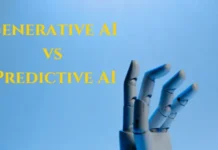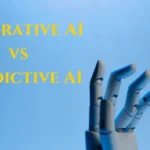What is Artificial Intelligence? In computing terms, it is the programming and development of machines and systems capable of using and interpreting information like the activities of a human.
AI technologies can understand, analyze and learn data through specially designed algorithms, which are complex mathematical formulas and operations.
A vast area with considerable potential
There are different areas of artificial intelligence. Machine learning, for example, is the ability of a machine to improve its performance through algorithms that operate on past results or interactions with the system. This allows smart learning technologies to learn without being explicitly programmed and to have multiple applications.
Other types of artificial intelligence include deep learning, a branch of machine learning that uses sophisticated artificial neural networks inspired by the human nervous system to learn from data that does not need to be (as opposed to machine learning), and natural language processing (NLP), a linguistic tool that allows machines to read and interpret human language.
What can Artificial Intelligence do?
One of the big goals of artificial intelligence is autonomous artificial intelligence, with machine learning being one of the specific scientific methods used in building AI.
With autonomous artificial intelligence, AI-powered computers, mechanisms, and systems could relieve much of the burden of decision-making, repetitive actions, and instantaneous response from humans, leading to greater efficiency and performance improvements at all levels.
This is one of the most optimistic views of how artificial intelligence will change the future. We are still far from reaching this level, and there are safety, ethical and practical considerations to consider before this becomes an achievable reality.
What is Artificial Intelligence used for in its current form?
Our artificial intelligence is weak or narrow AI, systems designed to perform specific tasks without human intervention and with limited autonomy in how they go about it. But even at this level, there are many.
Artificial Intelligence capabilities that are leveraged, such as the ability to sift through large amounts of data and make logical connections between past actions and different criteria. For example, you may have found your way to this web page through a search engine. This process was powered by artificial intelligence.
Here are some other examples of artificial intelligence at work:
- Personalization of news feeds and automatic recognition of similar characteristics in images on social networks.
- Product search and recommendations on e-commerce platforms.
- Voice-to-text conversion on smartphones and use of artificial neural networks to power voice search.
Where is Artificial Intelligence used?
These examples of artificial intelligence only scratch the surface of the volume of AI applications today. The technology is currently being deployed in many industries, including transportation, manufacturing, finance, healthcare, education, and urban planning.
In transport, for example, systems such as Google Maps can analyze traffic speed at any time, incorporating on-the-spot reports of traffic incidents such as construction works or accidents.
Predictive and preventive maintenance systems in the manufacturing industry help product manufacturers avoid costly downtime while integrating AI into quality control mechanisms improves production.
It has already been observed that machine learning helps financial organizations detect fraud. AI and smart learning also play a role in processing payments, depositing mobile checks and insurance, and recommending investment options.
Artificial intelligence devices and intelligent connected systems improve healthcare delivery and administration in many ways, such as remote diagnostics and telemedicine.
Automated document reading, scoring, and plagiarism checking powered by artificial intelligence help ease the workload of educators and provide an additional perspective to human instructors.
At the urban level, an evolving set of “smart city” technologies is beginning to deliver on its promise of optimizing public service delivery, traffic control, waste management, and other essential services.
Social Implications of artificial intelligence
These diverse applications provide ample evidence of the benefits of artificial intelligence to society. AI for social good is a rallying cry for those who emphasize the value of artificial intelligence as a driver of emerging technologies such as big data, robotics, and IoT (the Internet of Things) and as a means of technological innovation in the foreseeable future.
AI optimists also see technology as a vehicle for job creation, with improved efficiency freeing up skilled labor to work in new areas and new areas of employment being generated by the support structure necessary for the AI itself.
Such views on how AI is used must be weighed with caution about the potential for mismanagement or abuse of artificial intelligence and the unpredictability of the technology if its evolution continues without the necessary security checks and balances.










![Imginn Instagram Story and Photos Anonymous Viewer Tool [Free] Imginn](https://www.iblogtech.com/wp-content/uploads/2023/09/imginn-150x150.webp)



